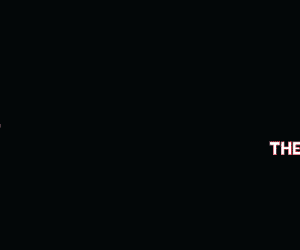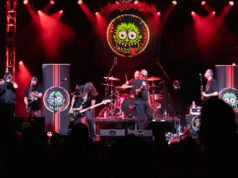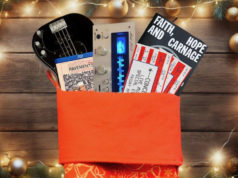Depending on which night you’re fortunate enough to catch local jazzbo Joey Carter, he could be playing anything. He’s been known to wail on the organ with local fusion pioneers Bertha Coolidge, tickle the vibraphone in straight-ahead settings, and now with the new band American Bedouin, he’s playing the doumbek, a Middle Eastern hand drum.
Led by Buddy Mohmed (guitar, bass) and rounded out by Dana Sudborough (percussion), David Lee Schloss (wind instruments), and Hunter Holmes (violin), American Bedouin has just released its debut album. Featuring flavors of Lebanese, Greek, and Arabic traditional sounds, plus jazz and blues, Peasant Company manifests a style the band has dubbed “Texanese.”
“I did the project because I have a longtime love of Middle Eastern music and playing doumbek,” said Carter. “I have worked with [Mohmed] for years in jazz groups and have a great respect for his musicianship. He is an amazing player, a great person, and his music is unique.”
When asked about his prevailing image as a pianist, Carter is noticeably amused. “That’s funny to hear, because I’ve only been seriously performing at the piano about 15 years now,” he said.
Carter has spent the past several years teaching piano and percussion at Texas Christian University, where he earned his master’s in music in 2000. A 1991 music education grad from the University of Texas at Arlington, Carter also teaches at Tarleton State University and has taught at UTA, Weatherford College, and Tarrant County College.
For this multi-instrumentalist, being hard to classify is nothing new. For the past 40 years, Joey’s father Rusty Carter has been making his living performing pop, rock, country, and swing as the lead singer of an informal band that became a regular at the Petroleum Club in the 1970s and ’80s. Those gigs were Joey’s first performance opportunities. “I got a lot of advice on those gigs and learned by doing,” he recalled.
As a teenager, Carter saw himself mainly as a drummer, but musicians’ stereotyped attitudes toward stickmen encouraged him to try, well, better respected jazz media like vibes and piano. “I often got the feeling that many people I played with assumed that since I played drums, I didn’t know anything about melodies and chords,” Carter said. “I wanted to show them that I did.”
The switch to vibes in the mid ’90s led to several years of steady gigs, many produced by the now-defunct smooth jazz radio station The Oasis with his friend Tom Burchill on guitar. The venues were unconventional, to say the least. Shows would happen at “car dealerships, grocery stores,” Carter remembered. “They were very random.” (Oasis program directors apparently didn’t mind or notice that Carter and Burchill always eschewed smooth jazz in favor of straight-ahead.)
Carter’s career as a jazz pianist began unexpectedly when local legend Johnny Case needed to find a steady Monday night substitute at Sardines Ristorante Italiano, where Case held a nearly nightly residency for more than 25 years. Case already had faith in Carter’s piano chops. “I recall that first tune he played for me, ‘Monk’s Mood,’ ” Case recalled. “If you can get a handle on [Thelonious] Monk, the other stuff is a piece of cake.”
The following 15 years of sitting in for Case confirmed Carter’s reputation as a pianist first, but he still finds himself playing pretty much anything he can get his hands on. He hasn’t lost his love for vibes, his preferred instrument for straight-ahead, but when TCU recently needed a drummer to back up legendary jazz trumpeter Randy Brecker, Carter was happy to trade in his mallets for sticks. “My focus has always been on the music,” Carter said. “A musical instrument is not the music, but the conduit used to bring it out. If the music is clear in your ear and mind, the instrument becomes less important.”
While he might be quick to decry the shortage of jazz venues in Fort Worth, Carter continues to fill his evenings with steady gigs, working at Arts Fifth Avenue as part of a group known as the Jazz Collective, at Scat Jazz Lounge, at the Kimbell Art Museum, and just about anywhere that still hires jazz musicians. For Carter, it doesn’t matter where the gigs are or even what instrument he’s playing. In the end, it comes down to one thing.
“I just love playing,” he said. “I also feel very strongly that different styles of music are more the same than different. Instruments all present different problems, but the ultimate goal is the same: to make music.”












Joey Carter is a Texas Treasure! We are so proud and happy to have Joey as part of the American Bedouin coterie. One correction: “Peasant Company”( http://www.amazon.com/American-Bedouin-Peasant-Company-Mohmed/dp/B00C4T817E/ref=sr_1_2?ie=UTF8&qid=1369935150&sr=8-2&keywords=American+Bedouin ) is American Bedouin’s second album; the eponymous first album was released in 1999 and featured Fr. Worth’s Mark Menikos, Reggie Reuffer, Shelley Carrol and Kenny Grimes. ( http://www.amazon.com/American-Bedouin-Buddy-Mohmed/dp/B00000JYW0/ref=sr_1_2?s=music&ie=UTF8&qid=1369935306&sr=1-2&keywords=American+Bedouin )
Joey Carter was the man who taught me to love music theory at TCU. An awesome musician with an equally awesome outlook on life! Wish more people were as sincere as he is.